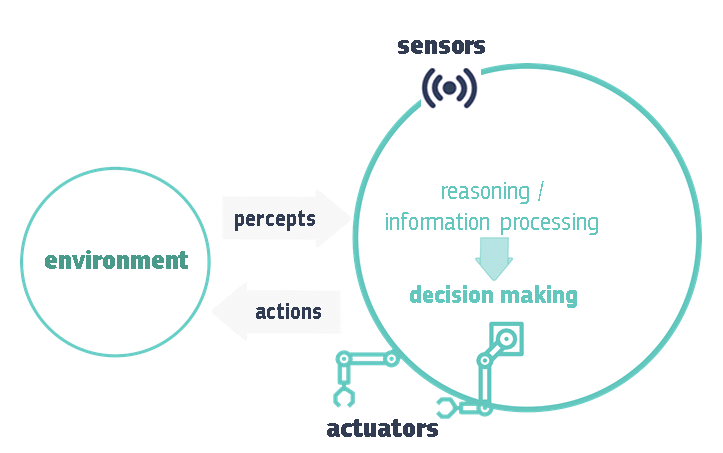- From: ProjectParadigm-ICT-Program <metadataportals@yahoo.com>
- Date: Thu, 9 Jan 2020 16:35:36 +0000 (UTC)
- To: Paola Di Maio <paoladimaio10@googlemail.com>, carl mattocks <carlmattocks@gmail.com>
- Cc: W3C AIKR CG <public-aikr@w3.org>
- Message-ID: <1640949470.9152719.1578587736560@mail.yahoo.com>
Back to a previous post from June 19, 2019:
At the center of our discussion is Artificial INTELLIGENCE.
Please see:
https://ec.europa.eu/futurium/en/ai-alliance-consultation/guidelines#Top
And download the Definition of AI by the High-Level Expert Group.
Look at figure 1: A schematic depiction of AI.
Information is seen as an actionable item, yet is not linked anywhere in this figure to knowledge directly.
An essential characteristic of knowledge is that it is stored or resides "somewhere".
Yet knowledge is key in creating information by means of processes which depend on knowledge representation.
So the ordering suggests: KNOWLEDGE<-->KNOWLEDGE REPRESENTATION<-->INFORMATION<--> DATA
So knowledge representation and how we create knowledge, either based on formal reasoning or experience (formal theory or massive amounts of data based deep learning) are two essential elements of any trustworthy, ethical and robust AI system.
The 64 million dollar question is whether we just want to model and capture the chain KNOWLEDGE REPRESENTATION<-->INFORMATION<--> DATA or also include the more elusive and not clearly defined concept of knowledge in AI and autonomous systems.
If we avoid knowledge, knowledge representation which includes natural language provides a much better common ground for any scientific, philosophical or for that matter ethical discussion on AI and autonomous systems.
And when dealing with knowledge representation we have several scenarios to ponder on:(1) the practice of empirical science, (2) decidability in theory of computation, (3) formal proof of Godel for incompleteness, (4) description of sentient beings (and possibly also intelligent) interacting with their environment, (5) Buddhist logic on falsehood of perception of external realities through our fallible senses, (6) modeling our formal interpretations of quantum reality and abstract mathematical spaces, (7) modeling information theory limitations of observed environment in terms of formal description and algorithms for decision-making.
All of these deal with knowledge representation, either using natural language or formal systems or both and all can be modeled using category theory.
And all can be blended as long as we adhere to maximum consistency and coherence.
We can now agree on natural language as the common ground and CL ans STRATML as key ingredients for conceptual structures.
Leaves open the issue of percepts which is the domain of Buddhist logic, philosophy, psychology and neuroscience.
Here is where category theory plays a role.
Milton Ponson
GSM: +297 747 8280
PO Box 1154, Oranjestad
Aruba, Dutch Caribbean
Project Paradigm: Bringing the ICT tools for sustainable development to all stakeholders worldwide through collaborative research on applied mathematics, advanced modeling, software and standards development
On Thursday, January 9, 2020, 11:40:49 AM AST, carl mattocks <carlmattocks@gmail.com> wrote:
Agreed - natural language is start point for AI explaining and CL is good for KR mapping of natural language statements. John Sowa acknowledged that CL does not map well to RDF / OWL declarations. Fortunately, (noted by Owen) the XCLX language provides an enhanced level of interoperability between general-purpose KR languages and XML-based structured data... and is a bridge to RULEML , RDF/OWL and STRATML , etc.
Carl Mattocks
It was a pleasure toclarify
On Thu, Jan 9, 2020 at 2:00 AM Paola Di Maio <paola.dimaio@gmail.com> wrote:
following various exchanges, I wonder if are these two 'languages' formally aligned?
if one of our missions is to promote natural language as a formal KR, (over, say, other formal notations) then I say our best bet is CL, because it is demonstrated as logically valid, needs no further proof
If stratml can be mapped to CL, then also stratmL or any other ML that can be used equivently to CL, and to formal notation
Is this the underlying argument I see lurking into the threads referencing CL and natural language?
P
Attachments
- image/png attachment: 1560959510337blob.jpg

Received on Thursday, 9 January 2020 16:35:44 UTC